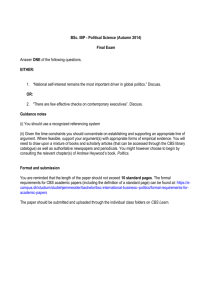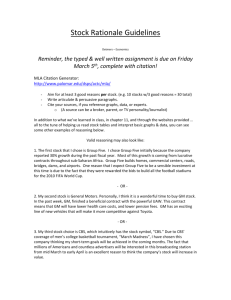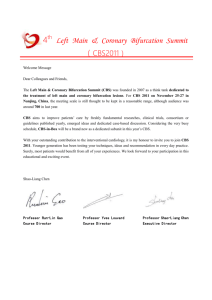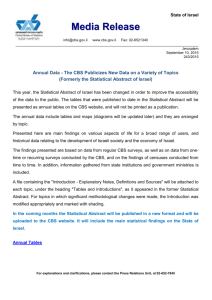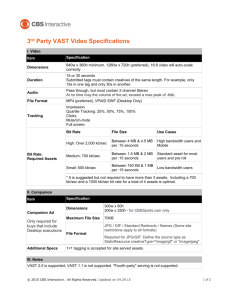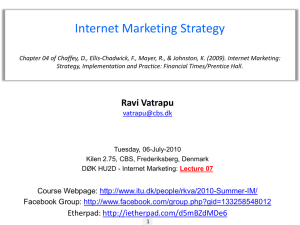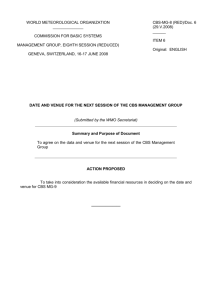Core Banking Solution (CBS) IT Modernisation Project
advertisement
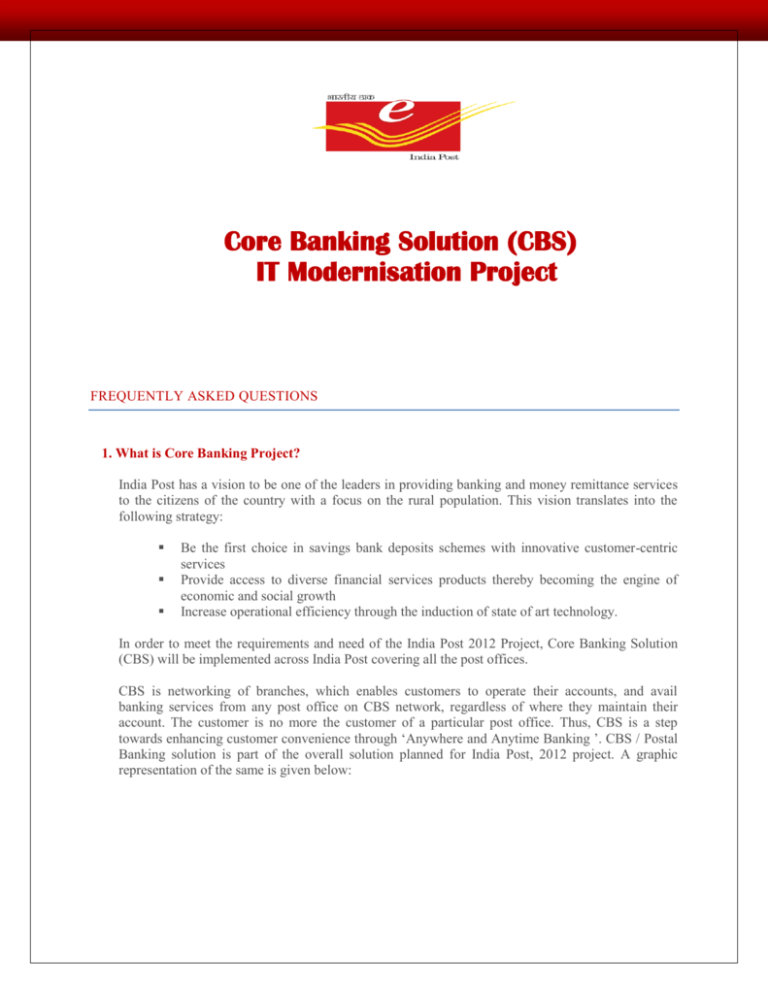
Core Banking Solution (CBS) IT Modernisation Project FREQUENTLY ASKED QUESTIONS 1. What is Core Banking Project? India Post has a vision to be one of the leaders in providing banking and money remittance services to the citizens of the country with a focus on the rural population. This vision translates into the following strategy: Be the first choice in savings bank deposits schemes with innovative customer-centric services Provide access to diverse financial services products thereby becoming the engine of economic and social growth Increase operational efficiency through the induction of state of art technology. In order to meet the requirements and need of the India Post 2012 Project, Core Banking Solution (CBS) will be implemented across India Post covering all the post offices. CBS is networking of branches, which enables customers to operate their accounts, and avail banking services from any post office on CBS network, regardless of where they maintain their account. The customer is no more the customer of a particular post office. Thus, CBS is a step towards enhancing customer convenience through „Anywhere and Anytime Banking ‟. CBS / Postal Banking solution is part of the overall solution planned for India Post, 2012 project. A graphic representation of the same is given below: * Information & Communication Technology 2. How it is different from the existing Sanchay Post? Sanchay Post is a LAN (Local Area Network) based application. CBS on the other hand is a centralized application with browser based interface. There is no need for servers at the post office level for running CBS. CBS will have the following features which are not available in Sanchay Post: real-time 24x7 processing capability, centralized database, availability of alternate channels, capture of KYC (Know Your Customer) details, adequate audit & inspection features etc. 3. What is the need for Core Banking Solution? Need for Core Banking Solution: Improve operational efficiency - reduce cost of operations Core Banking will provide various alternative delivery service channels, which reduce cost and time taken for the transactions. Currently banks‟ counter transaction costs are around Rs. 45-50 per transaction. On the other hand, the transaction cost of withdrawal from an ATM is Rs. 15-18. For net banking, the cost is Rs. 4 per transaction. The centralised process of core banking will also improve efficiency by avoiding duplication of work in post offices from Branch Office (BO) to Sub Post Office (SO) to Head Post Office (HO). Improve customer service Core Banking will improve customer services by providing services through alternate channels on 24 x 7 basis – ATM, Internet, Phone, SMS and Mobile Banking. Customers would be able to operate their accounts, and avail banking services from any post office on CBS network, regardless of where they maintain their account. Comply with Anti Money Laundering (AML) / Know Your Customer (KYC) requirements It is easy to comply with anti–money laundering norms through core banking. The AML norms require the post office to detect when a customer has opened multiple accounts. This is not possible in Sanchay Post. Moreover, compliance with KYC norms is required to issue debit cards to the customers. Integrate with electronic payment systems Integration with electronic payment systems will allow Department of Post to participate in an inter-operable electronic payment network run by the National Payments Corporation of India. This will help in quick and safe transfer of funds through National Electronic Fund Transfer (NEFT) and Real Time Gross Settlement (RTGS)/ 4. What are the benefits of CBS project? CBS will provide the following benefits: Anytime and Anywhere banking (online mediums / SMS) Standardised, simple and automated processes Increase in quality of the service provided to the customers Timely and accurate information for management decision making Strong audit and internal controls Bring down the cost of transaction and thereby improving operational efficiency Paving way for new value added services thereby generating additional revenue for the Department 5. What are the objectives of CBS project? The key objectives are as below: To increase the number of customers To provide multiple delivery channels like internet, mobile banking, ATMs, thereby bringing access to financial services to the doorsteps of the customers To enable faster money fund transfers to reach out to more customers To become one stop solution for financial inclusion initiatives of the Government of India 6. How many ATMs are planned? 1,000 ATMs are planned as part of this project. 7. What is ATM switch? The ATM Switch application is the core application which handles all ATM transactions and enables routing of transactions and ATM card management activities. It provides an interface between the CBS application and ATM network. 8. Does the project have any linkage with Project Arrow? Yes. Project Arrow has linkage with CBS project. Project Arrow monitors data entry and signature scan activities which are part of pre implementation activities of the CBS project. 9. What will be the role of SBCO post CBS? The role may get redefined based on process changes. As duplication of work is not envisaged in CBS environment due to a centralized data base, SBCO work will not involve feeding of any data. Checking of deposit/withdrawal vouchers will be crucial, as it has to be done at near real time basis to avoid frauds. 10. Will CBS improve service delivery? Yes, implementation of CBS will improve service delivery since facilities like Anytime and Anywhere banking would be provided besides standardised and automated processes. The time taken for transactions will be reduced by providing services through alternate channels on 24 x 7 basis – ATM, Internet, Phone, SMS and Mobile Banking by facilitating transfer of money through NEFT (National Electronic Fund Transfer) or RTGS (Real time Gross Settlement System). 11. What is the roll out plan? The FSI (Financial Services System Integrator) will deploy the CBS solution in all post offices (POs) and Circle Processing Centres (CPCs) as given below: Pilot 8 circles with 112 Head Post Offices, 12 MDGs, , and 8 Circle Processing Centres (in Karnataka, Maharashtra, Rajasthan, Uttar Pradesh, Tamil Nadu, Assam, Andhra Pradesh and Delhi) Phase 1 All remaining Head Post Offices, 759 Mukhya Dak Ghar and Lower Selection Grade Sub Post Offices, 750 Sub Post Offices, and 14 Circle Processing Centres Phase 2 2423 Mukhya Dak Ghar and Lower Selection Grade Sub Post Offices and remaining Sub-Post Offices. 13. What is the difference between a debit card and ATM card and which one will the department be issuing? ATM cards allow withdrawal from ATMs alone. However a debit card not only allows withdrawals from ATMs but also transaction in shops and merchant establishments. Department will be issuing debit cards to account holders. 14. What is double entry accounting system? Will CBS have double entry accounting system? Yes, CBS will have double entry accounting system. A double-entry bookkeeping system is a set of rules for recording financial information in a financial accounting system, in which every transaction or event changes at least two different nominal ledger accounts. This accounting logic will be inbuilt in the CBS software. However, all cash based accounting reports including day end reports will be available for accounting purposes till department shifts to accrual based accounting system. 15. Whether all the schemes have to be migrated to CBS? Yes, all existing schemes will be migrated to CBS. This is needed due to the fact that firstly Sanchay Post will be phased out and secondly due to interface with the new POS ( which will replace Meghdoot software), integrating all the applications of the post office. 16. Whether there will be a master data for each customer? Yes there will be master data for each customer and each customer will have a unique customer id. This will link one account with all other accounts. 17. Who will manage the cash for ATMs? The cash management, forecasting and loading will be done by the financial services system integrator through its ATM partner. However, cash has to be supplied by post offices. 18. Is ATM an outsourced model? What are the major components of outsourcing? Under the India Post 2012 Project, ATMs shall be sourced on a lease model under the scope of the FSI (Financial Services System Integrator). ATM outsourcing includes the machines, ATM managed services, cash management and some part of site preparation. 19. What are the service levels we are aiming at? CBS implementation will enable “Anytime and Anywhere Banking”. This is the main service level criteria being aimed at as part of the India Post 2012 project. The indicative Service Level requirements (SLRs) are given below: Availability SLRs for CBS Type of Applications CBS application deployed at data centre CBS application deployed at Banking CPC & HOs CBS application deployed at Urban SOs CBS application deployed at Rural SOs and BOs Monthly ATM/CD uptime Expected Service Level 99.99%(24*7*365) 99% (Business Hours) 98% (Business Hours) 97% (Business Hours) 99%(24*7*365) 20. Who will run the call centre for banking? How the staff will resolve issues while implementing CBS? There will be an internal helpdesk to resolve the issues faced by the internal staff of DoP in relation to the products and solution/ applications implemented as part of India Post 2012 Project. A call centre will be available for the DoP customers. Both (internal helpdesk and call center) will be managed by the core system integrator as part of its scope of work. However till CSI is on board, helpdesk will be run by FSI. 21. Whether passbooks will be issued? Yes, passbooks will be issued. There is no change in process in issuing passbooks. 22. What is financial inclusion? How CBS will help in financial inclusion? Financial inclusion is the delivery of financial services at affordable costs to sections of disadvantaged and low income segments of society. Unrestrained access to public goods and services is the sine qua non of an open and efficient society. It is argued that as banking services are in the nature of public good, it is essential that availability of banking and payment services to the entire population without discrimination is the prime objective of public policy. India Post is already handling the Government‟s sponsored schemes like Mahatma Gandhi Rural Employment Guarantee Scheme (MGNREGS) and micro finance through NABARD. CBS will ensure that service delivery becomes more effective and new services/schemes can be introduced more conveniently and in a reduced time frame. India Post through its network of rural network will become a one stop for delivering various financial schemes of the Government. Better implementation of small savings schemes as per terms and conditions, reducing possibilities of irregularities while transacting business under small savings schemes. 23. What is any time any where banking? Anytime, Anywhere banking means that the banking customers can make inquiries and transactions at any location and at any time via multiple channels like ATM, internet banking, phone banking, SMS etc. 24. What are the online facilities planned under internet banking for CBS? The key online facilities that will be provided to the CBS internet banking users are:, change of contact details, cheque book request, apply for and report loss of debit/ATM card, view mini statement of past few transactions, bill payments etc. 25. What are the process changes planned? Some of the key process changes as mentioned below: Online update of transactions on Core Banking Solution (CBS) platform at the networked post offices Proper indexing, scanning and tagging of all account opening and KYC related documents Adapt new internal audit processes in line with the best banking practices All balances will be calculated automatically and no need to maintain office wise balance registers Account opening will continue to take place at Head Post Office and Sub Post Office; however, the processing of modification of status related requests will take place at Circle Processing Centers (CPC) Transfer of funds to accounts standing in CBS enabled Post Offices through NEFT (National Electronic Fund Transfer) / ECS (Electronic Clearance Services) / RTGS (Real Time Gross Settlement) Instant transfer of funds between accounts standing in CBS enabled Post Offices Deposit would be done at any CBS Post office, irrespective of where the account is maintained Withdrawal would take place from any post office running on CBS or POSB ATMs MIS can be generated at any given time Facilities of e-banking and mobile banking for accounts standing in CBS enabled Post Offices Every customer will be first allotted Customer Identification File (CIF) Number which will be a different from the account number. All the accounts opened by the same customer will be linked to his CIF number which will help in validating the limits of investments/number of accounts prescribed in the rules automatically at the time of opening account. 26. Whether CBS will make job easy? Yes. CBS will make the job stress free as there will not be any possibility of data manipulation at any stage. 27. What is the need to migrate Recurring Deposit and other schemes in CBS? CBS was proposed for all schemes. Therefore, all schemes will be covered. RD is most complicated schemes in terms of calculations which will be done automatically by CBS. 28. Will auditing be required in CBS? In CBS, it is necessary to match account number mentioned in the voucher as well as entered into the system. Reconciliation of electronic transactions will also be required after introduction of CBS. 29. What is the need for Anti Money Laundering (AML) compliance? Yes. Department of Posts has now become under Prevention Money Laundering Act 2002 (amended in 2012) as a Financial Institution and it is legally bound to follow all PML Rules. 30. What is the need for Know Your Customer (KYC) compliance? Under Prevention Money Laundering Act 2002, it is mandatory to collect three documents as KYC documents from each customer at the time of start of banking relationship i.e. Photograph, ID and Address proof. 31. Will the existing pass book printers be used? Yes, existing Passbook printers will continue. 32. Whether SOSB will have any role post CBS? SOSB‟s role will continue till the time all the SOs of a HO are migrated to CBS. Post that there will be no SOSB role. 33. Will the CBS implementation lead to abolition of posts? No there will be no abolition of post. 34. What will be the role of System Administrators post CBS? Role of System Administrators will be as trainer as they will be given User Champion Training and they will also see proposer functioning of hardware. 35. Will single handed post offices be covered in CBS and how, as computers are not available there today? All Single Handed SOs have been provided computers now. In CBS Roll out plan, Single Handed SOs are in last phase. 36. Sanchay Post licenses are for 12,000 sub offices (including attached offices). How the other offices will be covered? Will they be directly migrated to CBS from manual operations? Manual data of all manual offices wil be digitized by FSI Vendor and then will be migrated into Finacle after validation by DOP. 37. The computers that are used in Post Offices are old. Whether the post offices will require new computers and new servers to run Finacle? No server will be required to run Finacle. Old computers will be used for operating CBS by enhancing configuration if required. For any feedback, please write to us at connect.indiapost.cm@gmail.com Abbreviations Abbreviation Description ATM Automated Teller Machines CBS Core Banking Solutions COTS Commercially Off the Shelf Solution CPC Circle Processing Center ECMS Enterprise Content Management System ECS Electronic Clearing Services FSI Financial Services Systems Integrator FSI Financial System Integrator GL General Ledger HO Head Post Office MGNREGA Mahatma Gandhi National Rural Employment Guarantee Scheme MIS Management Information Service NEFT National Electronic Fund Transfer PLI Postal Life Insurance PO Post Office POSB Post Office Savings Bank RBI Reserve Bank of India RICT Rural Information and Communication Technology RPLI Rural Postal Life Insurance RTGS Real Time Gross Settlement SDP Service Delivery Platform SI System Integrator SMS Standard Messaging Service SO Sub post office SOA Service Oriented Architecture
